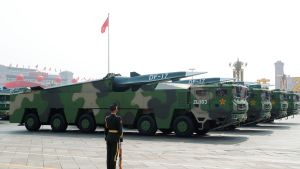The Oppenheimer Effect: Reigniting Nuclear Awareness
 Play Podcast
Play Podcast
About the Episode
Deep Dish explores the recently released 'Oppenheimer' film and journeys back to the Cold War era when nuclear weapons were etched into popular consciousness. Rachel Bronson and Avery Restrepo of the Bulletin of the Atomic Scientists explore how nuclear weapons have seemingly faded from public awareness. They draw parallels to today and suggest ways that Gen Z can shape a safer and more responsible future.
- What Oppenheimer can teach the new generations about nuclear weapons, Magritte Gordaneer, Bulletin of the Atomic Scientists, July 31, 2023
[Brian Hanson: INTRO: This is Deep Dish on Global Affairs— going beyond the headlines on critical global issues. I’m your host, Brian Hanson, with the Chicago Council on Global Affairs.
Today, we delve into the recent Oppenheimer movie, a gripping story that takes us on a journey back to a pivotal moment in history - the birth of nuclear weapons.
Oppenheimer is a poignant reminder of the dangers to humanity unleashed by nuclear weapon. And Matt Damon's character General Groves ponders that danger on the eve of the test they code-named Trinity. Here he is, in the movie, questioning whether a nuclear explosion might set the atmosphere on fire before moving forward with the test...
(SOUNDBITE OF FILM, "OPPENHEIMER")
By revisiting this historical period through a contemporary lens, the film has reignited public awareness and conversations about the ongoing relevance of nuclear threats and raises questions about what can and should be done to address the challenges posed by modern nuclear arsenals. At the same time, watching an elite group of scientists developing massively destructive weapons in secret can leave the public feeling overwhelmed, and powerless to influence threats that emerging technologies like AI, biotech, and the militarization of space.
Here with me to explore that potential are two people from the Bulletin of the Atomic Scientists!
Rachel Bronson is the president and CEO where she oversees the publishing programs, management of the Doomsday Clock, and work around nuclear risk, climate change, and disruptive technologies.
Also joining us is Avery Restrepo. Avery is the social media coordinator, where they create digital content to inform and mobilize public engagement on the existential threats the Bulletin focuses on.
So, I was in a movie theater, watching Oppenheimer, and one of the things that struck me was the vast majority of the audience was between the ages of 20 and 40, not 60-year old’s like me. And as the credits started to roll, I felt this sense of almost hopelessness, but wasn’t sure if I was alone in that. Rachel says that she didn’t end up quiet as hopeless as I did, and that’s because of the public engagement she sees at the Bulletin every day, which is a young fast-growing audience...]
Rachel Bronson: About half, is under 35 years old and its global. So, the millions of people who come to us every year, half of them is in the United States and half outside. And the reason I share that is just because I don't see people disengaged on this issue the way I think some of my counterparts do in similar organizations. We see real engagement and I think it's because we provide Information in accessible ways. We were digital early, but it's important. I think it's true that maybe young people aren't as engaged on nuclear per se, but I think that's for a variety of reasons. 1 is in society today. We are overwhelmed by existential issues right back in the 40s from the movie. What you see Oppenheimer and his Colleagues working on it will become the first breakthrough that can threaten life on earth as we know it. Right? And all of that attention was the 1st of its kind. Now, today, we're experiencing the effects of climate change - which absolutely right is caused in part by our technologies and scientific breakthrough. We think about pandemics and bioengineering and what that future will bring. What we see in Oppenheimer is that moment at the end where the scientists begin to lose control of the narrative. However, what we know is they go on to form institutions like the Bulletin of the Atomic Scientists with Oppenheimer as its first chair, Hans Bethe, Edward Teller, all of them that we see in the movie become involved in the Bulletin and other organizations. And although it takes a number of years, many of the arms control agreements and the reduction efforts that we see come out of institutions like the ones I just mentioned. So, the scientists lose the narrative, but they stay engaged. They do have positive effects and they bring others involved. We often say that war is too important to leave to the generals. These issues, scientific breakthroughs, are too important to leave to the scientists. They cannot do it alone. They need us. They need the journalists. They need the university leaders. They need the professors. All of this to make sure their voices are heard. And we're at a critical moment around those issues today.
Brian Hanson: That's really interesting. I think the self-awareness of the scientific community in establishing the Bulletin that it needed to be part of engaging and mobilizing the public is really important. Avery, I want to bring you in, and I'm particularly interested in your engagement with digital media. You are a different generation than Rachel and I are part of. What do you see going on? What's resonating and do you see that same kind of engagement that Rachel just talked about?
Avery Restrepo: Absolutely. I do. and I think some of the nuances of the engagement, especially falling Oppenheimer are really interesting. I think that Oppenheimer for a lot of people, my age and younger is really the first exposure they've had to parts of history and parts of American history, like the Manhattan project in the Trinity test, even the bombings of Hiroshima Nagasaki, right? these are things that are often, like touched on in history classes in high school but they're often glossed over or they're just kind of referenced in very black and white language and it differs a lot also across the country what people have learned about. I've had fascinating conversations about this with people I've gone to college with, colleagues of mine. and so, I think what I've seen playing out online is people kind of grappling with that people who have either only heard kind of one aspect of the story or people who haven't really heard the story at all. Finally, making that connection between that huge chapter of American history and kind of where we are now and where we are now with the conflict in Russia. I think when I share my job with friends, be it at like a party or being at lunch, one of the first things across the board that I'm asked, even after I explain that we also do climate change, even after I explain that we cover other topics, is what's going on with Russia and Ukraine. That is at the top of people's minds. And I think I hear a lot of... concern that people my generation are not concerned about nuclear issues that is only a cold war issue. And I just don't think that's true especially in the last two years and I think the last two years have really defined that as being part of what people are concerned about and I think that, I agree with the point that Rachel made about, we're kind of dealing with a lot of crises at the same time and I think people in my generation feel that very strongly, right? We notice that every summer it's getting hotter, right? I grew up in the northeast of the US and I remember every year, you know, when I was a kid. There'd be snow on the ground. Now there's not. And we've lived through two recessions. We've lived through COVID and through a pandemic the likes of which we, multiple generations, hadn't seen. So, I think people my age are highly attuned to this sense of things are changing. And, when I walked out of the Oppenheimer movie, I have to be honest, Brian, like, I also felt that kind of doom, that, oh, we are on an unchangeable path to destruction. I definitely walked out of that being very concerned. And also concerned a little bit about the messaging of the movie. What are these people taking away from it that may not know a lot about the history? But I've been kind of heartened by people's responses to it. I think you do definitely have the dark humor response of like all the memes, all the reactions online. There are fun, and I think they are, in a way, like a coping mechanism. But, you also see a lot of people saying how can I better understand these topics? How can I do something?
Brian Hanson: Before the movie came out, actually the Chicago council on Global Affairs teamed up with the Carnegie Corporation. We did a poll on nuclear issues to see what the public knew and cared about. And a lot of the findings are completely consistent with what you both just talked about. We found 6 and 10 Americans would like to learn more about nuclear weapons and nuclear policy. And 58%, so about the same number, also said they didn't know enough to assess whether nuclear weapons benefit or harm them. And it was interesting because of the millennials and Gen Z were even lower. It was in the high thirties who felt they knew enough. And that last kind of finding that was interesting for us is that 2 and 10 Americans would like to be more involved in making an impact on nuclear policy. So, we see this kind of interest in learning more and you pointed out, Avery, with Russia's war on Ukraine and the conscious kind of raising of this possibility of nuclear weapons. It's brought it home for all of us. And again, this was all done before Oppenheimer came out. So, there was this moment in which there's a receptivity to this. And I'd be curious, Avery, you talked about, folks in your generation kind of being interested in learning more, being interested in getting involved. What about the nuclear issue resonates with people? What are the aspects that capture their attention and cause them to say this is something I want to dig in on and learn more about?
Avery Restrepo: What I've seen resonate the most with people tends to be approaches or topics that engage with one of the two big challenges I see with getting people like interested in nuclear issues. I think one is that it's very scary. And the other being that it's kind of hard sometimes to draw like really specific connections to nuclear issues with people's day to day, like lived realities. You know, we've already talked in this conversation about, oh, climate change and COVID and all these big things people have lived through. But there's also just the day-to-day realities of paying rent and taking care of your kids and passing your classes in college. And I think what I've found that has really resonated with people are things that kind of reference those two things. I think, some of the things that I've heard people be the most interested in seeing the most engagement with are things about concrete action that's taken place about nuclear politics. I remember just a couple of years ago learning about, for instance, like the 1982 march on Central Park, against nuclear weapons and learning that oh, in my backyard, there were over a million people marching against this, not that long ago. Over just about 40 years ago and there were a lot of people fascinated because this was just around the time of like the Black Lives Matter protests about seeing mass action about different issues of today and seeing that parallel and making that connection, I think, was really powerful for people seeing that there has been action. I think it's something that really grips people that to the point we've made about the ending of Oppenheimer that there is a way out that there is like hope, that their are ways to minimize risk. I think that's really powerful. As well as drawing specific connections, for instance, like how expensive nuclear weapons are, right? Like connecting it to everyday politics that people really care about is also really powerful.
Brian Hanson: Full disclosure, I actually worked for the freeze campaign, which was the effort to just freeze, stop the arms race which generated that over a million people in Central Park, which was the largest political rally of any kind ever in US history up to that moment. And to a point that you made, Avery, the theme of that gathering was freeze the arms race, fund human needs, right? So it was, there are tradeoffs if we spend all his money on arms, we're not taking care of the other issues that are important, in our lives. Rachel, could you talk a little bit about that historical moment, that mobilization, and to what extent did that mobilization actually have an impact on policy?
Rachel Bronson: I think there are a lot of parallels that we can make, today, but what you had in the 80s is in many ways, a culmination of some of these movements and institutions and efforts that Oppenheimer and his colleagues had started really way back in the early fifties. So, again, going back to what we talked about early, sometimes these things take a lot of time, but you had people working day in, day out and a growing sense that we can actually create an alternative future. And you had this period basically the 70s to really 2010 of a golden age of arms control wasn't easy, it wasn't always moving in the right direction, but there was progress something we definitely don't have now. But there was a sense that history was moving in the right direction, and we could actually work with our adversaries and reduce the threats of destroying the planet. And as we move from the early arms control and reduction efforts of the early 70s up through the 80s, there was a very loud and public debate, almost like an Oppenheimer-Teller kind of debate, but now writ large between the Hawks. And we think of Reagan and Reaganomics and the people working in the Defense Department. who really thought we needed to build more and more and more intense and bring more powerful weapons. And we would overwhelm the Soviet Union and those who also were working along at the same time and say, you know, this is madness and mobilizing on the street. So, you had this political moment where these kinds of debates that you see beginning the seeds of them in the Oppenheimer movie, really coming to fruition in the 80s. And you have very Sensible voices and very articulate voices on both sides who are leading to this very noisy, but important set of conversations even within the strategic community, right? Which is like, is it abolition or is it control and reduction? And those are still debates that we're having today…
Brian Hanson: Get rid of them entirely or reduce the numbers,
Rachel Bronson: Right when you were, reaching numbers of 70, 000 nuclear warheads, on this planet. Which was insane. And you see Oppenheimer kind of talking about that at the very end of the movie too, like, don't we have enough? Why do we need hydrogen bombs? We've got atomic bombs. They're fine. They're gonna do what we need them to do in terms of deterrence. We don't need bigger weapons and we're still having those debates. So, I think there was a moment, Brian, and the public was very engaged in it and they could see they could make a difference. And so, you pointed out, this really interesting focus on costs and spending that really drove so many people to the streets. And I think it's something we can really talk about today, which is then, right, this notion of are we investing in our safety? And I think that's a question we really must be asking ourselves now the US is on the cusp of spending 1.8 trillion over the next 30 years on a new nuclear arsenal to keep up with the changes that the Russians and the Chinese and others are making. So, we are about to spend that amount of money and to keep us safe, supposedly right at the time when we know our public health investments are failing us dramatically. We saw that during COVID, and it's just accelerated to this day to this moment, where we're not as engaged in it. Are we investing in climate change mitigation efforts that we need to be? Absolutely not. The things that we are spending on to keep us safe, we should have a big question mark of whether that's really where the dangers lie in a future or a present that is struggling with these transnational global threats. So, I think this tradeoff and costs remain center. I don't think we're articulating it the way that we need to. But I think there is a tradeoff there. A second issue I would point to in terms of issues of today, and there is, here again, some hope, is just last week, the US House of Representatives put into the NDAA, the Defense Act, the Spending Act, money to deal with restoration needs of impacted communities. What do we mean by that? There are communities in the United States that were downwind from the tests. There are people, who have mined uranium, who to this day, they and their successors, their families, continue to struggle with the consequences and the effects of all the testing that we did in the United States. And in the New York Times, there is a quote, we nuked our own people, right? In these tests. And there's never been restitution, there's never been the kind of support to acknowledge and help them with the medical and mental challenges that they and their family continues to deal with. It's called RECA legislation. It has been put into the defense spending bills, right? So, this is something we should be watching for. These are consequences of weapons on American people that actually with our attention can make a real difference. And it seems like it may get through and it may get through on a bipartisan basis.
Brian Hanson: So, Avery, I'm really interested in following up on a couple of issues to get your take on younger generations, what resonates. So, Rachel talked about the costs of this program and what we're spending on nuclear weapons, which obviously is taking money that could be spent other places. The other issue that she raised was the people who have been harmed in this country by nuclear weapons and by the tests that we saw very vividly in the Oppenheimer movie. Do those issues resonate with younger people and are there additional issues that also are really important to engaging younger generations and next generations in these issues?
Avery Restrepo: So, the Radiation Exposure Compensation Act, one of the groups that has historically been left out of that, program has been the Trinity Test Downwinders. So specifically, the test that was, shown in the Oppenheimer movie and that the Oppenheimer movie kind of, centered on. And I think that has been a really powerful connection, just people realizing that, oh, there were people outside of that test that I watched the representation of and I felt a certain way about in the movie. And I recently, for the bulletin, spoke to an advocate named Tina Cordova, and she told me about how, there are members of her family who are just a few, years younger than I am, who currently have thyroid cancer. Understandably connected to the radiation that they grew up around from that test, now five generations after. I know that's something that really struck me. I can speak, of myself as a member of my generation. I keep returning to that fact as I've watched the movie, that people of my generation are currently still having ramifications to their health that are currently suffering due to the test, right? So, while, you know, I hesitate to say that I'm speaking for all of Gen Z, what I see just from spending a lot of time on social media, what I see from following these tags is like a lot of concern about just what can we do? I think that there is that feeling of like kind of hopelessness that feeling of well, this is just happening and there's nothing we can do about it. And I think sharing both historical information that, to the contrary, right, as we've discussed, like the protests, the treaties, the history of activism, is very powerful. As well as, like the facts that, there are less bombs now than there were in the Cold War, like the arc has, gone down, even if now, again, with the invasion of Ukraine by Russia, that that is, looking to be, like, in danger. just putting into perspective where we are right now, I think is really powerful and placing the current moment in a continued history that people of my generation can be a part of, right? That it's not like the concerns we have right now are not in isolation and that there are concrete things that you can do about it. That there are things to be done right now that directly relate to that movie that they just saw that they see all the memes about online, and that there are real life ramifications.
Rachel Bronson: This focus on the downwinders and the uranium miners, the Navajo, and other countries, the Marshallese Islanders, those living in Kazakhstan, places where they're testing by not focusing on them in the past, we've erased people out of this very high tech science based strategic conversation, but it's what's happening to people and like our connections to them that actually brings people to this issue often. And some we should think about some of the intentionality about erasing people from the narrative as a way of keeping the public out of these discussions and then interestingly, happily, we no longer actually test these things above ground, but it means we're not seeing them. We're not hearing of them on the news. We're not thinking of the consequences. So, there's so many benefits for not doing that and letting the computer simulators do this, but the effects are it keeps again us from seeing this it's in the past. Nobody's really affected anymore. And it's not true, but there's, a keeping people out of this narrative. And so, I just also want to go back, Brian, what you were saying, the scientists, even again, of them, them losing the narrative. Secrecy does that. Secrecy keeps the public out. And what we're watching in Oppenheimer is a secret project that doesn't become visible until the bombs are dropped. And what we see is an American public not engaged in it because they don't know about it. And that's true globally, right? And so, it does take time. And you see Oppenheimer and his colleagues right after they are on the ground talking to people, engaging the public. The Bulletin was established literally to engage the public. They understood how democracy worked. And they were operating under, 10 years of secrecy or 5 years at that point of secrecy. And so, it really does take conversation. And so sometimes it's brought up, you know, what is the one thing that, someone can do, and Avery's job depends on it. The one thing you can do is talk to someone you know about these issues. Talk about the movie. Take them to the movie. What did you learn? What was surprising? Those conversations, which seems so diffuse and unimportant, they layer up. And when you're talking about with the 80s, people would talk about these issues at the dinner table, right? And it didn't just go from nothing to everything. You need to kind of talk about this and think about the challenges. These are complicated issues and around the world, there's people who had the effects of this, suffered from it, continue to, we need them in this conversation because there's a social justice about what we owe them in terms of, being heroes in this effort, but also we can make a difference now and we need them in there also because without people, it's really hard to have these conversations.
Brian Hanson: You know listening to this and, Avery, that example of five generations later, still having cancers, right? That this is ongoing. And what happened all those years ago is very present and affecting people's lives. And I was thinking too back to the cultural moment of the 80s where it seemed like every month there was a new movie or something popular coming out about this, right? There was even like a Dan Aykroyd and Chevy Chase comedy about nuclear war. It was just so ever present. And then this pivotal moment “The Day After”, which depicted what it's like on the ground after a nuclear attack. You see the characters who go develop radiation sickness. You see the fact that you can't even grow food on the ground. It's really bleak, but really powerful because these are everyday people and how war would affect everyday people. And there's, you know, connecting to the current day, one of my favorite movies at the time, called “War Games” with Matthew Broderick, which is about computer hacking into the US government computer system and nearly starting a nuclear war. My point in this... is, this was a cultural moment. And Avery, let me ask you to the extent to which, how important is that for continuing this conversation and bringing in a sustained dialogue and a sustained engagement with these issues? How important is that kind of cultural moment?
Avery Restrepo: Yeah, absolutely. I mean, I think that's something that certainly top of mind, right? Is how long is this going to last? Like, when will people move on? because that is unfortunately how these things work. And, thankfully for the nuclear community, it's lasting quite a while, right? The movie, people continue to see it every weekend. We see more people talking about it, especially. So, it does have continued relevance think part of why Oppenheimer is so notable in this regard is because at least in my lifetime, I can't think of a cultural moment like this, that focus on nuclear issues in the same way. If anything, multimedia things like video games and, I think it's some of these video games and you get a little like missile launcher that shoots tiny nukes at people, you know, there's definitely I think sometimes the wrong message to send as well, right? So, I don't want to make the mistake of saying, ah, yes, all the media is good and it's all going to get people interested for at least the right reasons. But it sparks conversation at the very least. And there were a lot of people talking about, does this game have the right message? And people did still have reactions to it, you know? But I definitely think this is like a moment that, will have, like, a long tail, people will definitely keep talking about this. Next February we'll have award season, people will be talking about it again, you know. But it's definitely a really exciting moment, I think, seeing because people will remember the movie, you know. Even if in a couple years it's not, like, in the news or it's not trending in the same way, people will still have that kind of cultural touchpoint.
Brian Hanson: I want to link back to one of the things that we flagged at the beginning which was, we also live in a time where this isn't the only existential threat that is on our mind and in some ways, maybe this is joining. This is bringing nuclear issues into a conversation that is broader and things like climate change in general. But I would be curious, Rachel we saw the Manhattan project in secrecy, developing this huge destructive power. And as we look around today, what are the equivalent projects, technologies that are emerging that people ought to be paying attention to and maybe getting it out in front, to be able to shape our future?
Rachel Bronson: That just feels so dizzying right now, right? That like everywhere you look it just things aren't going in the right direction, and it feels very dangerous. It is very dangerous, and it can feel really hopeless. I find some comfort, actually, in one of the key goals of the Bulletin laid out by our founding editor, which was to manage the dangerous presence of Pandora's box of modern science. And for me, that helps actually give some clarity about what's this world that we're living in. Science is moving fast and there are more and more issues that are really on the knife's edge of bringing huge benefits and huge harms. And the answer lies in being able to govern them. Whether we can come up with governance and regulations to control the risks and the harms. And what we're feeling now is, we're not moving fast enough. Every major arms control agreement has been shredded but one between the US and the Russians. We're not building and layering on, we're shredding them because they don't work in the estimations of some. And we're not creating the kinds of institutions we need to, to manage climate change. Pandemics, this notion of the origin of COVID, it's less important in some ways, what caused COVID than the fact that we know from what we've seen now, is that we will have naturally occurring pandemics and likely have pandemics that leak from a laboratory. If not intentionally created. And now we're talking about artificial intelligence and huge leaps. We know that artificial intelligence is going to bring great benefits. It already is, but also the leaders, the tech leaders, of it now are telling us that they are worried. These are the same sets of issues manifesting in different areas. Our political response to scientific innovation is woefully lacking. Our moral ethical conversations about how do we manage dual-use technologies is woefully lacking and that's why I think we are rightfully feeling frustrated and disengaged and fearful. The good news is it's a political answer. This is about politics, about regulation, and what are the institutions we need to build. So, for students out there and young folks out there, that's what we need you working on. We need new imagination about how we build institutions in a fast-moving scientific world, that spans so many different issues at a time when global leaders are not interested in building these new structures. That's really the challenge of our future. They’re the dangerous presence of Pandora's box of modern science. We know that our predecessors built institutions to deal with them. That went on and did have an effect and a positive effect and didn’t solve the problem but did have an effect. We need those kinds of institutions now in 2023 and beyond to begin to try to reduce the dangers that we're living in.
Avery Restrepo: If I may really quickly add on to something Rachel had just said, about like future and what we can do and that there is a role for people like in my generation, like in even just to be really specific in like the nuclear issues fields like in nuclear policy. Right. I there was recently an article in Politico, that came out about, the lack of nuclear experts in the fields and how there's far fewer and they're All right. Aging out, retiring, and it really painted this, relatively gloomy picture, right, of the future of, nuclear studies. And all I could honestly think about reading it is, like, yes, but there might be, like, not many now, but 20 years, there's going to be this huge wave of professors and people doing research on nuclear issues, and people will ask them, well, why did you get involved? And people are going to say, When Russia invaded Ukraine, and there's going to be a small amount of people who are going to say, like, when Oppenheimer came out, and I learned more about these issues, and I got interested. And for that, I do feel really optimistic.
Rachel Bronson: Avery, when you said in 20 years, first of all, I think it's less than that. I think we will see it in 10 and we need it as fast as possible. But everyone that I know who's working in this space and teaching at universities, their classes are over subscribed. And by like hundreds, these are big auditoriums, so we don't have maybe the number of classes being taught, but those who are teaching it, they're experiencing this rejuvenation, but at a time where, many of the traditional funders are exhausted by this topic and where, many who are like more senior in the field or looking elsewhere. So, I think it is a bit of a crisis and that's what the Politico piece was getting at. But there is this hunger. I also think something the Politico piece missed is, yeah, there were all these people working on it, but a lot of those people all look the same. And the result was that they lost the larger public. It became very expert. It became inwardly focused. And very exclusive. And so, we're also responding to some of those funding decisions that Politico was celebrating that actually did not help keep the public with the experts. It drove them away. And so if we can get, more attention on this and more money comes back in, hopefully we'll learn from that too. The Politico piece didn’t quite touch on that.
Brian Hanson: And one of the things that, was so important to generate the political interest in that was the public involvement, which focused political leaders on having to deal with these issues, in new ways. And Avery, one of the new tools is social media and digital media of various kinds. could you talk a bit about what you see as the most effective tools, regardless of generation, to get the public more engaged and how can this contribute to driving that kind of urgency around these issues?
Avery Restrepo: Yeah absolutely. When I read over the Chicago Council's and Carnegie's, recent survey, one of the findings is that 16% of people surveyed trusted social media as a source of nuclear issues, because that for me was the, huh. I, and I have to say I'm not surprised, because I do think that, you know, there's a lot of people talking about nuclear issues online. And I also don't want to be too negative, there are some people who, contribute really amazing, like, analysis or thoughts or information about nuclear history, especially, who are not directly connected to organizations with the history of talking about these issues or with academic connections and things like that. So, I also don't want to stomp on people that connection. That being said, there are also a lot, there's a lot of misinformation. There's a lot of sensationalization of these issues, especially. And so, I do think it is like a challenge for the community to continue to bolster our relationships with an audience on social media. Because it is ultimately the widest, most successful audience that we and anyone has. So, I think that continuing from there, some of the best ways to like bolster that relationship are video, like using video content. You know, it's sometimes it's a challenge but it really does reach people in a way that, just text and graphics don't. Really drilling down on making connections to people's everyday lives and why does this matter to you? And why does this matter to them? Because that's kind of what people often go on social media for, right? They will go on Twitter or X or whatever will come after for like the news and for what's going on right now, and they'll go on Instagram often for their own personal connections, but a lot of people go on Instagram for like activism and to follow their politicians and celebrities they like and things that connect to their everyday life that they want to see every day. And that doesn't mean we have to be like overly positive or have rose colored glasses about anything. But people follow what interests them in what they see as being part of their worldview and their world. So, I think like just making content about the issues with that understanding of what people want to see on social media. And even just asking yourself, if I saw this post on social media, would I click on it? Would I look on it? What do I want to see?
Brian Hanson: So, as we bring this conversation to a close, I want to ask you both the same question, which is what gives you hope about our future when it comes to nuclear weapons?
Avery Restrepo: I mean, I don't want to be too repetitive, but I do think, issues that are often kind of depressing or kind of scary, right? These are existential risks. And I do think that people are responding, and people are concerned, and people are like acting and I think that that is, powerful and I think even just keeping an eye on those people. What are people doing? What activism is happening? What advocacy is happening? What laws are being passed? it's easy to get lost, I think, again, in sometimes, especially social media, can be sensationalized and things can be portrayed as overly scary because you get more clicks, right? And sometimes things are just scary, and they get more clicks because they are just scary. But, when I really want to, like, ground myself, I do look to all the work that people are doing and how many people my age and younger are getting invested in these issues. Like, I went to a vigil recently to commemorate the trinity test, and to commemorate like downwinders who died as a result of like their illnesses from the radiation. And honestly, it was very interesting. It was pretty much, people maybe over 40 and above. in people my age and lower. And there were all these college students whose, a lot of them had taken a class with a professor who is present, and some of them were their friends who found out about nuclear issues from their friends who were taking the class, and they showed up, and they were there in person in midtown Manhattan, holding signs, right, and we were having a whole conversation, and so it's happening, and I think it's not always visible depending on where you are. but those are like the anecdotes that I will remind myself of if I get a little down about things.
Brian Hanson: And Rachel, what gives you hope?
Rachel Bronson: Several things give me hope. One are some of the statistics that I mentioned in the beginning of, this conversation use them because they give me hope, our audience is growing. People from where I sit, people care, people are looking for our content. They're looking for shows and conversations like this. That gives me hope and especially given my day job, Avery's day job, people ask this question, but in some ways, I feel like it's easier for me because I am engaged. And so there are many organizations that are engaged in these issues from the arts to academia to advocacy organizations to think tanks. And just pick one that feels right and just find a way to engage because even that it just makes it all feel less hopeless. You're suddenly surrounded by a community who cares and you realize there's a lot of people trying to work on these issues. And that can be motivating. So, I feel like I have it the easiest in some ways because it doesn't seem hopeless because I see people working on it all the time. It's hopeless to me when I do see shrinking population, shrinking funding, all of that. But when I see growing audiences, I think there's a lot of power there. And I think going back to what Avery was saying, we might be in this moment now, but if we handle it right, 5 years from now, 10 years from now, we're working against the clock, but if we can grow this, we will begin to create a safer future here in the United States, but around the world, that's what gives me hope. I think my job, which seems so gloomy and dreary is actually what gives me hope because I see people working on these issues every day. And that's what ultimately is going to make the difference.
Brian Hanson: Rachel Bronson and Avery Restrepo of the Bulletin of Atomic Scientists. I want to thank you so much for being on Deep Dish and sharing how this is a cultural moment where Oppenheimer, the movie, people are actually talking about these issues and our potential to shape a safer and more responsible future.
Avery Restrepo: Thank you.
Rachel Bronson: Thank you, Brian. Outro:
[Brian Hanson: OUTRO: And thank you for tuning in to this episode of Deep Dish!
A reminder that we want to hear more from you, our listeners. So, send us an email or, better yet, a voice memo, to deepdish@globalaffairs.org You can suggest issues you’d like us to cover, guests you’d love to hear from, or you can just let us know how you think we’re doing.
And if you are looking for more Deep Dish in your podcast diet? Tap the “follow” button in your podcast app so you get each new episode as it’s released. If you think you know someone who would like today's episode, please "share" it with them!
As a reminder, the opinions you heard belong to the people who expressed them and not the Chicago Council on Global Affairs. This episode is produced and edited by Kyra Dahring (Dare-ring) and mixed by Frank McKearn from Aphorism Productions.
Thank you for listening. I’m Brian Hanson and we’ll be back next week with another slice of Deep Dish.]






Related Content
 Public Opinion
Public Opinion
While crediting the US nuclear arsenal for its deterrent effect, Americans are less clear on its impact on the country or their personal safety.
 Defense and Security
Defense and Security
What's driving China's rapid nuclear triad expansion? Nuclear expert Tong Zhao joins Deep Dish to explain.
 US Foreign Policy
US Foreign Policy
Sixty-one percent of the US public is uneasy with only the president having the power to authorize the use of nuclear weapons.

